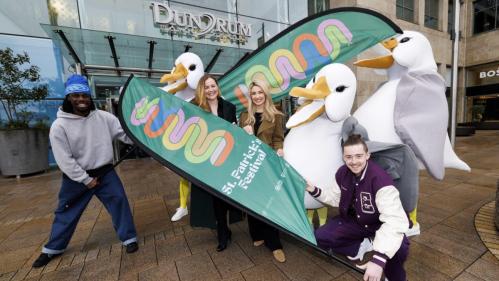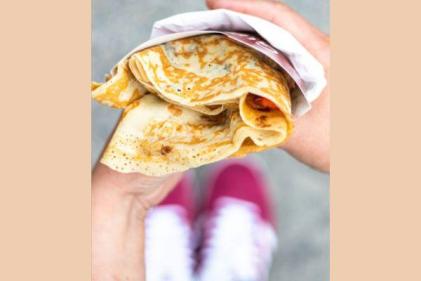Irish mum-of-one Niamh NicLiam has recounted her powerful story on social media of the fact that herself and her family are facing Day Zero in Cape Town - the day in which the taps will turn off and the city, effectively runs out of water. City officials say this will now happen in July 2018, but for Niamh, her husband and their young son Liam, they already feel the effects of this all too well. It's unfathomable that a city, in 2018, should be experiencing a water crisis of this degree, but it is a reality.
Below, Niamh has kindly agreed to share her story with MummyPages, "to give people back home an insight into the reality that there isn't an infinite supply of water and that we need to look after and conserve it - all this in the context of the debate around water charges in Ireland."
She explains the facts of the matter, living day-to-day, the measures taken to conserve the little that’s left and how, as a mum, she and her family cope with the lack of water. Scroll for more and please join us in sharing their story so that we might help raise more awareness as Day Zero draws ever-closer:
"The price of water.
Not enough. Cape Town is facing into Day Zero. It’s a reality. It’s the day the taps are turned off and it’s happening.
We have hardly any water.
For 18 months the water shortage has been in the headlines starting with initial restrictions that limited the watering of gardens to every second day (or something like that) when nobody thought that we were ever truly going to run dry.
Despite regular increases in restriction level, many residents have continued to live in a bubble, wasting so much of this precious resource. In June 2017 Level 4 water restrictions were imposed. This allowed a maximum of 100 litres per person per day and at the time that seemed impossible. Now we’re at level 6B, which limits usage to 50 litres per day and it’s still not enough.
The problem is that while the word restriction implies an absolute cut off, the reality is that it’s still up to individuals to make their own decisions and limit their own use.
We pay for water here in Cape Town, and while the tariffs are based on usage, this is very small and very affordable for a lot of residents, particularly those who use it to water their gardens, wash their cars and fill their pools. As Day Zero loomed closer and closer, these tariffs were only recently increased to discourage unnecessary use, or to penalise those to used too much.
My reality is that I shower in a bucket every second day. When I shower I use the least water pressure possible to wet my hair and my body, and then I turn off the tap. I lather my hair and my body, and then I repeat step one. Then, the water left in the bucket is used to flush the loo, which given the minuscule amount of water in said bucket, now only happens once or twice a day. Nice. On the non-shower days, I wash with a facecloth.
Our toddler’s ‘baths’ involve him sitting in about an inch of water in his baby bath every second day. It’s not ideal, but he still manages to have toddler bath fun and get clean.
We contacted our washing machine and dishwasher manufacturers to find out which was the most efficient cycle to use in terms of water, and then we still try and limit our use of either to ‘only when necessary’. That said, capturing the rinse cycle water from the washing machine does allow us to significantly top or our toilet flushing supply!
Every tap is turned off within seconds of it being turned on, and there are bowls in every sink in the house to capture as much water as we can to add to the flushing supply. I could go on. We’re conserving a lot, though to be honest, there are those who are doing more.
Day Zero is going to happen in July (so they say now) and after that, there’ll be 200 collection points, guarded with armed security, for a city of 4 million. I don’t know what will happen then, but we can only hope for lots of rainfall this winter along with real leadership to guide the city through this disaster.
...I'm looking forward to the day when I can flush a toilet or wash my hands without being struck by a desperate dose of Irish Catholic guilt, but water conservation has become my new normal and even when / if we have an abundant supply in the future, I will never take it for granted again.
In terms of parenting, in theory, yes, it's a bit more awkward but we've all just gotten used to it. We were lucky that the restrictions really only started getting bad around Liam's first birthday and we didn't have to worry about sanitisation and sterilisation 'as much'. We bath him every second day now, and the poor child, who's almost two and fairly tall, has to sit in about an inch of water in his original baby bath. He doesn't know any better so he still thinks it's great.
Liam
It's really hot here at the moment so sweat combined with sunscreen combined with sand (our garden is now a giant sandpit) makes a very dirty Liam by the end of the day, so if he's particularly filthy, we wipe him down with a face cloth before bed. We then throw him in the shower with one of us the next morning (we shower in the baby bath to capture the water, which we then use to flush the loo) so he still manages to get a bit of a bath and is vaguely presentable for school.
From an outdoors perspective, he LOVES water but he's only been able to use the paddling pool that I bought when he was 7 months old once as it's now gathering dust in the attic, and the pool that we were going to build has now been put on indefinite hold.
[It] all sounds fairly dramatic, and it is, but it's funny how you just get used to something and get on with it. With the imminent threat of Day Zero, most residents are really doing their bit now (you don't even blink if loo water in public toilets is a bit murky and looks a bit suspect these days). I was in a restaurant last week and aside from the usual loo-flushing posters in the stalls, they had removed their taps, replacing them with a hand sanitiser dispenser. Yes, it's irritating, and and I'm looking forward to the day when I can flush a toilet or wash my hands without being struck by a desperate dose of Irish Catholic guilt, but water conservation has become my new normal and even when / if we have an abundant supply in the future, I will never take it for granted again.
Cape Town might be the first major metropolis to run out of water, but it probably won’t be the last.
If you ask me about the price of water, it’s not enough."










